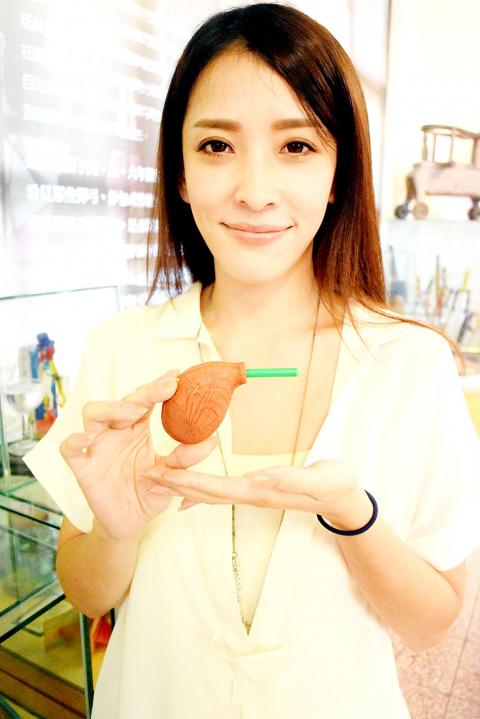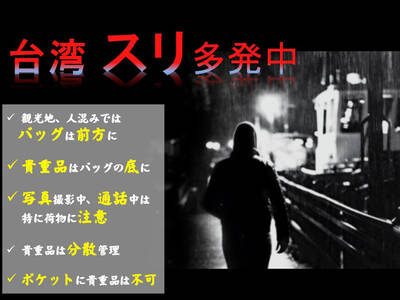A promise between father and daughter has not only changed the daughter’s life, but has also enabled the Taiwanese Toy Museum in New Taipei City’s Banciao District (板橋) 435 Art Zone to remain open to allow children to see and play with toys from another age.
The second-generation owner of the museum, 29-year-old Chiang Yi-hsin (江宜馨), said that after her father, Chiang Wen-ching (江文敬) died of a heart attack in 2008, her mother, Wang Pi-hsia (王碧霞), took over the day-to-day management of the museum.
Chiang Yi-hsin, who recently graduated from National Taiwan University of Arts, has now taken over managing the museum and handling its marketing and development.

Photo: Chen Wei-tsung, Taipei Times
Chiang Yi-hsin said her father was a veritable fount of knowledge when it came to toys, and despite running a convenience store with Wang for a living, toys were his passion.
“It was as if he had a sense of duty to them,” Chiang Yi-hsin said, adding that his continuous efforts to buy toys of every sort whenever he could contributed to more than one fight between her parents and almost led to a divorce.
Wang said Chiang Wen-ching had used the family’s liquor cabinet, which had held top-grade spirits, to store his toys, leaving the liquor on the floor.
“When Chiang Wen-ching first started the museum, I asked him to change the name to ‘collector’s exhibition’ to cut down on the expenses, but he refused to,” Wang said, adding that she had been angry at his stubborn refusal to change the name.
“I even thought that perhaps in his mind, the word ‘museum’ meant more to him than I did,” Wang said.
However, Wang said that eventually she came to understand and was moved by her husband’s determination, and had gone from scolding him for buying toys to buying toys for him.
“He was very happy every time he saw children playing with toys and having a good time at the museum and he would have this pleased look on his face, as if he were showing off something,” Wang said.
After Chiang Wen-ching died, Wang said she initially planned to close the museum, but later decided against it because she wanted her daughter to be able to keep her promise, as well as preserve a place her husband had been extremely proud of.
“I said to myself that I had to keep it open, no matter how tired I was,” Wang said.
Chiang Yi-hsin said that she had promised her father that she would not throw away any of his books and toys and that she would carry out his wishes that more people could come to see his toy collection.
“It was something that I had never thought about when I was younger, and I’ve always thought it was my dad’s own dream,” Chiang Yi-hsin said.
Looking at the children playing in the museum — for example with rubber-band guns fashioned from bamboo, or pinball tables, Chiang Yi-hsin said she hoped the toys would continue to please children.
Toys in this museum are not simply just toys; they carry with them the dreams and sentiments of an entire family, Chiang Yi-hsin said.
With a total of 3,000 toys in its collection, the museum can provide a tour of the history of toys in Taiwan over the past century. The diverse collection includes vases dating back to the Ming and Qing dynasties used in games in which the participants toss arrows into a vase, cloth and mud dolls, wind-up dolls from the Japanese colonial era, figurines that were popular from the 1940s to the 1960s and tin toys manufactured in Taiwan from the 1960s to the 1980s.
Among the collection are toys that Chiang Wen-ching had played with himself, including models of robots, tin toys and a tin top that, unlike the traditional method of spinning by rope, is spun by a spiral-shaped bar.
Chiang Yi-hsin said that children in modern times are more interested in audio-visual toys, but that toys from different eras have their own unique attributes.
From the materials, methods of manufacturing and the details put into toys manufactured in Taiwan in the post-World War II era, the influences of different cultures on Taiwanese society can be easily seen, she said.

GENSLER SURVEY: ‘Economic infrastructure is not enough. A city needs to inspire pride, offer moments of joy and foster a sense of belonging,’ the company said Taipei was named the city with the “highest staying power” in the world by US-based design and architecture firm Gensler. The Taiwanese capital earned the top spot among 65 cities across six continents with 64 percent of Taipei respondents in a survey of 33,000 people saying they wanted to stay in the city. Rounding out the top five were Vietnam’s Ho Chi Minh City (61 percent), Singapore (59 percent), Sydney (58 percent) and Berlin (51 percent). Sixth to 10th place went to Monterrey, Mexico; Munich, Germany; Sao Paulo, Brazil; Vancouver; and Seoul. Cities in the US were ranked separately, with Minneapolis first at

The Japan-Taiwan Exchange Association has cautioned Japanese travelers to be vigilant against pickpockets at several popular tourist spots in Taiwan, including Taipei’s night markets, the Yongkang Street area, Zhongshan MRT Station, and Jiufen (九份) in New Taipei City. The advisory, titled “Recent Development of Concerns,” was posted on the association’s Web site under its safety and emergency report section. It urges travelers to keep backpacks fully zipped and carried in front, with valuables placed at the bottom of the bag. Visitors are advised to be especially mindful of their belongings when taking photos or speaking on the phone, avoid storing wallets and

Scoot announced yesterday that starting in October, it would increase flights between Taipei and Japan’s Narita airport and Hokkaido, and between Singapore and Taipei. The low-cost airline, a subsidiary of Singapore Airlines, also said it would launch flights to Chiang Rai in Thailand, Okinawa and Tokyo’s Haneda airport between December and March next year. Flights between Singapore and Chiang Rai would begin on Jan. 1, with five flights per week operated by an Embraer E190-E2 aircraft, Scoot said. Flights between Singapore and Okinawa would begin on Dec. 15, with three flights per week operated by Airbus A320 aircraft, the airline said. Services between Singapore

ENDORSING TAIWAN: Honduran presidential candidate Nasry Afura said that Honduras was ‘100 times better off’ when it was allied with Taipei The Ministry of Foreign Affairs yesterday said it would explore the possibility of restoring diplomatic relations with Honduras based on the principle of maintaining national interests and dignity. The ministry made the remarks in response to reporters’ questions regarding an article titled: “Will Taiwan Regain a Diplomatic Ally?” published in The Diplomat on Saturday. The article said Honduras’ presidential election in November could offer Taiwan the chance to regain an ally, as multiple candidates have promoted re-establishing diplomatic relations with Taiwan. Honduras severed diplomatic ties with Taiwan in March 2023 in favor of Beijing, but since switching its diplomatic recognition,